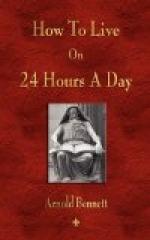You say I am dealing with minutiae. I am. And later on I will justify myself.
Now will you kindly buy your paper and step into the train?
V
TENNIS AND THE IMMORTAL SOUL
You get into the morning train with your newspaper, and you calmly and majestically give yourself up to your newspaper. You do not hurry. You know you have at least half an hour of security in front of you. As your glance lingers idly at the advertisements of shipping and of songs on the outer pages, your air is the air of a leisured man, wealthy in time, of a man from some planet where there are a hundred and twenty-four hours a day instead of twenty-four. I am an impassioned reader of newspapers. I read five English and two French dailies, and the news-agents alone know how many weeklies, regularly. I am obliged to mention this personal fact lest I should be accused of a prejudice against newspapers when I say that I object to the reading of newspapers in the morning train. Newspapers are produced with rapidity, to be read with rapidity. There is no place in my daily programme for newspapers. I read them as I may in odd moments. But I do read them. The idea of devoting to them thirty or forty consecutive minutes of wonderful solitude (for nowhere can one more perfectly immerse one’s self in one’s self than in a compartment full of silent, withdrawn, smoking males) is to me repugnant. I cannot possibly allow you to scatter priceless pearls of time with such Oriental lavishness. You are not the Shah of time. Let me respectfully remind you that you have no more time than I have. No newspaper reading in trains! I have already “put by” about three-quarters of an hour for use.
Now you reach your office. And I abandon you there till six o’clock. I am aware that you have nominally an hour (often in reality an hour and a half) in the midst of the day, less than half of which time is given to eating. But I will leave you all that to spend as you choose. You may read your newspapers then.
I meet you again as you emerge from your office. You are pale and tired. At any rate, your wife says you are pale, and you give her to understand that you are tired. During the journey home you have been gradually working up the tired feeling. The tired feeling hangs heavy over the mighty suburbs of London like a virtuous and melancholy cloud, particularly in winter. You don’t eat immediately on your arrival home. But in about an hour or so you feel as if you could sit up and take a little nourishment. And you do. Then you smoke, seriously; you see friends; you potter; you play cards; you flirt with a book; you note that old age is creeping on; you take a stroll; you caress the piano.... By Jove! a quarter past eleven. You then devote quite forty minutes to thinking about going to bed; and it is conceivable that you are acquainted with a genuinely good whisky. At last you go to bed, exhausted by the day’s work. Six hours, probably more, have gone since you left the office—gone like a dream, gone like magic, unaccountably gone!




